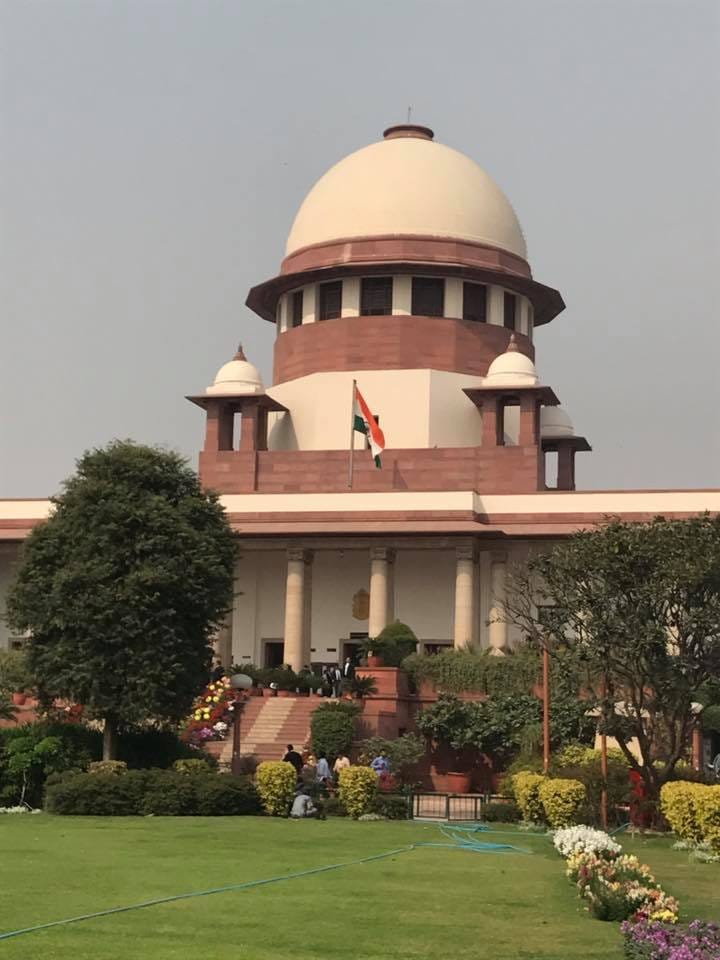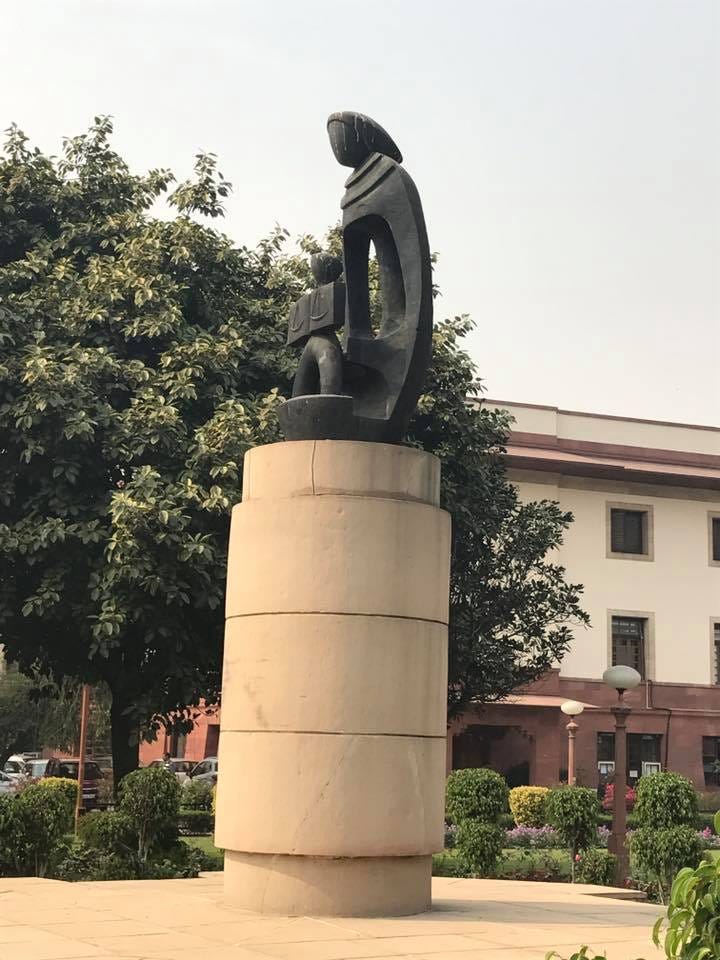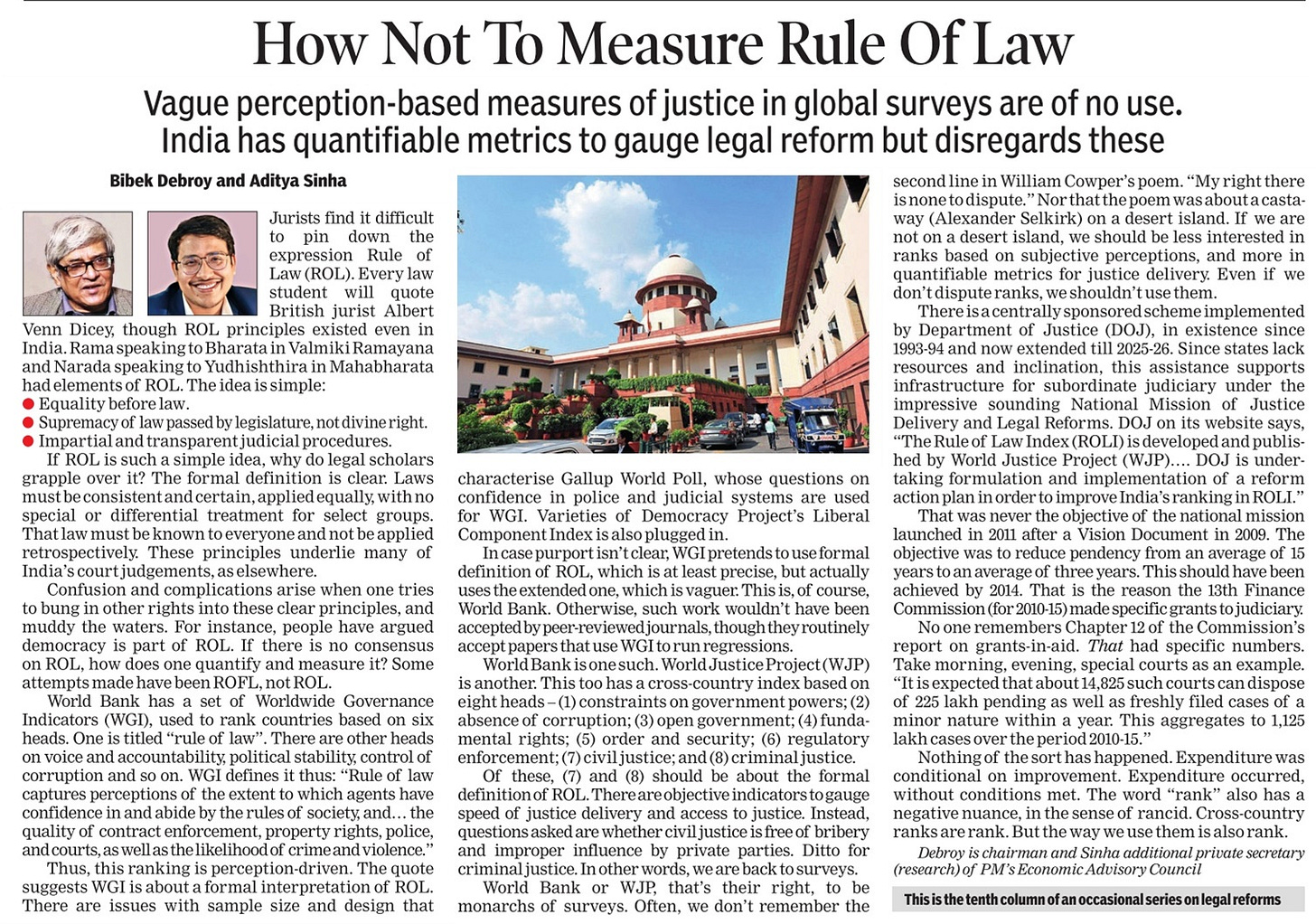'Measure for Measure': Is it the essence of "Rule of Law"?
Putting Citizens at the Centre must be the Cornerstone of any Pragmatic Judicial Reforms Package in India.
Putting Citizens at the Center: Proposing Pragmatic Judicial Reforms in India
Introduction: In any democratic society, an independent judiciary plays a pivotal role in upholding the “Rule of Law” and ensuring justice for all. As India embarks on the path of judicial reforms, it is imperative to place the citizen at the center of these transformative efforts. By focusing on principles such as the “Rule of Law”, equality before the law, legal certainty, fair and impartial justice, and respect for fundamental rights and freedoms, India can build an independent judiciary that is truly accountable to "We, the People" and serves as a cornerstone of a just and inclusive society.
Dr. Bibek Debroy1 and co-author Aditya Sinha wrote an insightful article titled "How Not To Measure The Rule of Law" in "The Times of India". They argued that relying on vague perception-based measures from global surveys is of limited usefulness. Instead, they emphasized the need for developing our own quantifiable metrics to assess legal reforms. While their suggestion is valuable, the article falls short, possibly due to space constraints, in providing specific areas that should be prioritized and measured. In this article, we delve deeper into this discussion, exploring the key thrust areas that require focus and selection for effective measurement of legal reforms.
The Rule of Law and Equality before the Law: The “Rule of Law” is a fundamental principle that ensures the accountability of all individuals, institutions, and entities to the legal system. It establishes a framework where no one is above the law, promoting equality, fairness, and justice in society. Equality before the law further reinforces this principle by subjecting every person to the same legal standards and treatment, irrespective of social status, wealth, or power. These principles lay the foundation for a just and inclusive society where the law applies equally to all.
Legal Certainty and Fair Impartial Justice: Legal certainty is essential for individuals to understand and comply with the law. It requires clear, predictable, and accessible laws that enable informed decisions and anticipate legal consequences. Fair and impartial justice is a cornerstone of the “Rule of Law”, demanding that legal processes be conducted with fairness, neutrality, and respect for the rights of all parties involved. Impartial judges and decision-makers, guided by evidence, legal principles, and the merits of each case, ensure that justice is administered fairly and equitably.
Respect for Fundamental Rights and Freedoms: “The Rule of Law” guarantees the protection and preservation of fundamental rights and freedoms. Individuals have the right to express their opinions, assemble peacefully, and receive due process under the law. This ensures a democratic and inclusive society, empowering citizens to freely participate, voice concerns, and seek legal remedies when their rights are violated. Upholding these rights acts as a safeguard against arbitrary exercises of power and protects individuals from unjust interference.
Independent Judiciary and Access to Justice: An independent judiciary is crucial for upholding the “Rule of Law”. Judges must be free from external pressures and influences, enabling them to make decisions based solely on the law and legal principles. Judicial independence safeguards the integrity of the legal system, promotes confidence, and protects against undue political or personal interference. Additionally, access to justice ensures that all individuals have the right to seek legal remedies and have their grievances resolved in a fair and effective manner. An accessible, affordable, and barrier-free legal system allows people to protect their rights, resolve disputes, and seek redress.
The World Bank's Worldwide Governance Indicator (WGI)
WGI provides a comprehensive assessment of governance performance, including the "rule of law" indicator that measures law enforcement, property rights protection, and access to justice. It offers valuable insights into legal frameworks, judicial independence, and corruption levels within the justice system.
However, the WGI's “rule of law” indicator has limitations. It relies on aggregated data and may not fully capture regional disparities or specific contextual factors within countries. To gain a nuanced understanding of the rule of law, a comprehensive analysis should incorporate other measures, stakeholder consultations, and local expertise. Despite these limitations, the WGI's “rule of law” indicator informs policy decisions, highlights areas for improvement, and contributes to transparent and accountable legal environments.
Ten Points for Pragmatic Judicial Reforms in India:
1. Expeditious judicial process: Implement measures to minimize delays, reduce case backlogs, and ensure timely justice for all parties involved.
2. Modest cost of obtaining justice: Reduce financial burdens associated with legal proceedings, enabling equal access to justice regardless of financial means.
3. "Bail not jail" rule: Advocate for the release of individuals awaiting trial, except in cases of the most serious offenses, upholding the presumption of innocence and protecting individual liberties.
4. Speedy trials and few undertrial prisoners: Streamline procedures and enhance coordination among stakeholders to expedite trials and reduce the number of undertrial prisoners.
5. Quick resolution of departmental inquiries: Establish efficient mechanisms for resolving departmental inquiries involving government employees, ensuring accountability and boosting public trust.
6. Efficient resolution of CAT cases: Prioritize the timely resolution of cases in the Central Administrative Tribunal (CAT) to provide swift justice for government employees and stakeholders.
7. Effective functioning of statutory tribunals: Strengthen statutory tribunals to ensure their quick and efficient resolution of disputes, reducing the burden on regular courts and promoting access to justice.
8. Land revenue courts/officers: Enhance the functioning and efficiency of land revenue courts and officers to expedite the resolution of land-related disputes.
9. Embrace arbitration and alternative dispute resolution: Promote the use of arbitration and alternative dispute resolution mechanisms to expedite case resolution and reduce the burden on courts.
10. Addressing the Special Leave Petition (SLP) overload: Encourage the Supreme Court to limit the use of Special Leave Petitions to constitutional questions, reducing routine cases and ensuring focused attention on constitutional matters.
The Way Forward: As India embarks on the path of judicial reforms, it is crucial to recognize the central role of the citizen and the need for pragmatic measures to enhance the judicial system. An independent judiciary that is accountable to "We, the People’ is not a contradiction in terms— rather is essential for upholding the “Rule of Law” and ensuring fair and impartial justice. By focusing on the “Rule of Law”, equality before the law, legal certainty, respect for fundamental rights and freedoms, and access to justice, India can build a judiciary that is accessible, efficient, and accountable to its citizens. This requires collaborative efforts from the higher and lower judiciary, advocates, central and state governments, civil societies, NGOs, the litigants and the media. The Supremes Court of India, holding high the pennant of “Independent Judiciary”, alone cannot achieve it.





